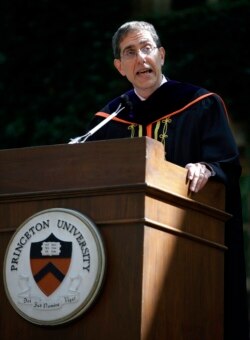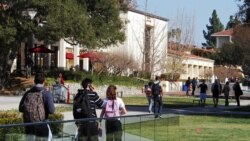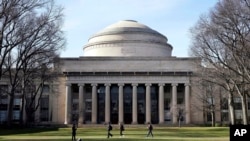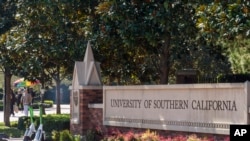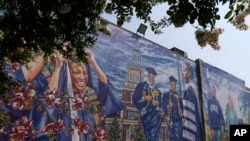Student Union
Ivy League President Calls College, University Rankings 'Daft'
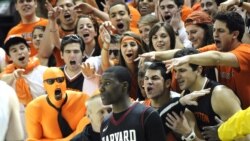
The president of Princeton University, which routinely leads the lists of best colleges and universities, advises applicants to be wary of choosing a school based on ranking lists.
"My university has now topped the U.S. News & World Report rankings for 11 years running. Given Princeton's success, you might think I would be a fan of the list," wrote Christopher Eisgruber in The Washington Post on October 21.
"Not so. I am convinced that the rankings game is a bit of mishegoss — a slightly daft obsession that does harm when colleges, parents or students take it too seriously," Eisgruber wrote, using a Yiddish word that means "senseless behavior or activity."
Rankings are highly popular and usually published around this time of year, application season for U.S. colleges and universities. An online search for "college rankings" reveals more than 66 million hits. While many companies and organizations publish such lists, the U.S. News & World Report rankings are seen as the most wide reaching.
Colleges at the top of such lists often are the hardest to get into. Low acceptance rates — less than 10% for the "best" schools — indicate those colleges receive far more applications than they have places for students.
Many applicants invest emotionally in a dream that is not likely to come true, in addition to spending up to hundreds of dollars on application fees. The colleges and universities with the highest application fees are also the most coveted and highest-ranking schools: Princeton, Harvard, Columbia, Yale, Stanford and the Massachusetts Institute of Technology.
According to the blog CollegeVine, a student applies to an average of eight to 12 schools per academic year. Fees per school can reach $100 per application, but students can request fee waivers.
Brevity over comprehensiveness
Eisgruber and others accuse U.S. News & World Report, which publishes numerous best lists on several topics each year, of capitalizing on brevity and convenience rather than comprehensive information.
U.S. News offers a lengthy explanation of its computation on its website, stating that it uses "multiple measures to capture the various dimensions of academic quality at each college. They fall into nine broad areas: graduation and retention, graduation rate performance, graduate indebtedness, social mobility, faculty resources, expert opinion, financial resources, student excellence, and alumni giving."
"The indicators include both input measures, which reflect the quality of students, faculty and other resources used in education, and outcome measures, which capture the results of the education an individual receives at the institution," it states.
U.S. News attracts "tremendous attention and a huge customer base. Their popularity has inspired many imitators," Eisgruber wrote.
These include the popular Princeton Review. The name of the publication might lead some to believe Princeton University endorses the review's choices. Not so. While the company was formed by a Princeton graduate who later founded the educational company Noodle Partners and 2U, the university has no connection with the publication.
"Don't get me wrong. I am proud of Princeton's teaching, research and commitment to service. I like seeing our quality recognized," Eisgruber said. "Applicants and their families, however, rely on the rankings and feel pressure to get into highly regarded institutions. As a result, many schools make intense efforts to move up in the rankings," he wrote.
In 2012, Claremont McKenna College in California admitted it had sent U.S. News boosted results that did not reflect the school's metrics accurately.
Eisgruber suggested applicants consult the U.S. Department of Education's College Scorecard, although the "data-centric interface can make it more attractive to policy wonks than to students."
He also wrote that he hoped "some national publication will have the courage to produce an annual, user-friendly Consumer Reports-style analysis of higher education institutions, even if it is not as beguiling as a football-style set of rankings."
He added: "Rankings, however, are a misleading way to assess colleges and universities. There are lots of great places to get an education. America's colleges and universities work collaboratively to educate the wide variety of people seeking degrees. Different schools may suit different students."
See all News Updates of the Day
Malaysian official: Schools can’t turn away from global tensions
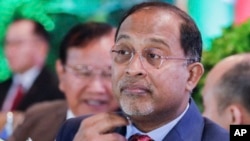
Zambry Abdul Kadir, Malaysia’s higher education minister, said protests spreading across universities in the United States show that schools can’t ignore political tensions.
Helen Packer, reporting in Times Higher Education, said the minister reminded educators that universities are key in the development of leaders, individuals and societies. (April 2024)
Social media breaks are difficult, but necessary

Between online classes, maintaining social connections and working on projects, college students can have a hard time disengaging from the demands of technology.
In Florida International University’s PantherNOW, Ariana Rodriguez offers strategies for taking a break from social media. (April 2024)
- By Melos Ambaye
Many master's degrees aren't worth the investment, research shows
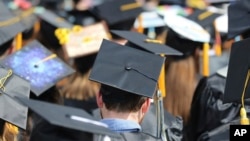
Nearly half of master's degrees have a negative financial return, according to new research by the Foundation for Research on Equal Opportunity, an economic research organization.
The study indicates that many graduate degree programs do not increase lifetime earnings enough to be worth it.
While 23% of bachelor’s degree programs yield a negative financial return on investment, 43% of two-year degrees and master’s degrees fail to deliver a return, according to the study by Preston Cooper, a senior fellow at FREOPP.
Cooper assessed the return on investment for 53,000 degree and certificate programs to determine whether a student’s lifetime earnings outweigh program costs and the risk of not completing their degree.
His findings show that a student’s field of study was the overriding indicator of return on investment at the undergraduate and graduate level.
Engineering, computer science and nursing bachelor’s degrees have high financial returns on investment, while programs in education, fine arts, psychology and English usually have low returns.
Graduate degrees in medicine and law tend to have strong payoffs. But a large share of master’s programs, including the MBA, frequently have low payoffs, according to Cooper.
Although workers with master’s degrees earn 16% more than those with only bachelor’s degrees, Cooper says the figure fails to account for students who had “higher preexisting earnings potential.”
“MBA students typically have high preexisting earnings potential, having often chosen high-ROI undergraduate majors such as finance and economics,” Cooper writes. “So the MBA adds little value on top of that.”
The study indicates that high starting salaries are predictors of high returns on investment. Degrees with starting salaries of $57,000 a year or more deliver the best lifetime returns.
But the return on investment of a degree can vary depending on the educational institution.
“Students interested in fields with low average pay can still find some schools that do well transforming those fields of study into high-paying careers,” Cooper writes.
The quality of an institution also matters, said William Tierney, professor emeritus of higher education at the University of Southern California.
“An MBA from Harvard is a likely ticket to a good job,” Tierney told VOA. “An MBA from the University of Phoenix, less so.”
But students pursue graduate programs for more than just financial reasons.
“Some degrees open up careers in fields that students may enjoy, such as in the performing arts,” Robert Kelchen, head of educational leadership at the University of Tennessee, Knoxville, told VOA.
“Others can help gain access to social networks or simply help students learn about a topic that is of interest,” Kelchen added.
Cooper told VOA that it might make sense for students in degree programs with low returns on investment to switch majors if they can still graduate on time.
He found the worst outcome for a student’s return on investment is dropping out of college “because they must pay for one or more years’ tuition and spend time out of the labor force.”
Lawmakers who fund higher education have a responsibility in ensuring “higher education delivers on its promise of economic mobility,” Cooper said.
Nearly a third of federal funding, including Pell grants and student loans, pays for higher education programs that fail to provide students with a return on investment, according to the study.
Cooper’s view is that “some schools should shut down low-ROI programs and reallocate institutional resources to programs with a better return.”
“There's definitely this narrative out there that higher education is always worth it, and you should always try to get that extra degree because it will increase your earnings,” he told VOA. “That's reinforced by colleges who make lofty promises regarding their graduate degree programs' outcomes, which all too often fall short.”
Harvard students end protest as school agrees to discuss Gaza conflict
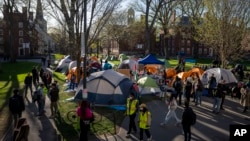
Protesters against the war between Israel and Hamas were voluntarily taking down their tents in Harvard Yard on Tuesday after university officials agreed to discuss their questions about the endowment, bringing a peaceful end to the kinds of demonstrations that were broken up by police on other campuses.
The student protest group Harvard Out of Occupied Palestine said in a statement that the encampment "outlasted its utility with respect to our demands." Meanwhile, Harvard University interim President Alan Garber agreed to pursue a meeting between protesters and university officials regarding the students' questions.
Students at many college campuses this spring set up similar encampments, calling for their schools to cut ties with Israel and businesses that support it.
The Israel-Hamas war began when Hamas and other militants stormed into southern Israel on October 7, killing some 1,200 people and taking 250 hostages. Palestinian militants still hold about 100 captives, and Israel's military has killed more than 35,000 people in Gaza, according to Gaza's Health Ministry, which doesn't distinguish between civilians and combatants.
Harvard said its president and the dean of the Faculty of Arts and Sciences, Hopi Hoekstra, will meet with the protesters to discuss the conflict in the Middle East.
The protesters said they worked out an agreement to meet with university officials, including the Harvard Management Company, which oversees the world's largest academic endowment, valued at about $50 billion.
The protesters' statement said the students will set an agenda that includes discussions on disclosure, divestment, reinvestment and the creation of a Center for Palestine Studies. The students also said that Harvard has offered to retract suspensions of more than 20 students and student workers and back down on disciplinary measures faced by 60 more.
"Since its establishment three weeks ago, the encampment has both broadened and deepened Palestine solidarity organizing on campus," a spokesperson for the protesters said. "It has moved the needle on disclosure and divestment at Harvard."
Chinese students report interrogations, deportations at US airports
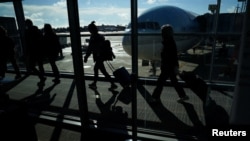
Academics from China are reporting increased scrutiny at U.S. airports, with valid visa holders being interrogated and turned away by Customs and Border Protection Agents.
Phones and laptops have been searched, and researchers have undergone extensive questioning about their work. One graduate student at Yale, who was midway through her PhD, was turned back at Dulles airport and banned from entering the U.S. for five years, according to The Guardian.




